Are you interested in electronics? But of course, the theory is boring. So let’s start with a simple electronic circuit for beginners or who want a circuit that can be made quickly and cheaply.
First of all, we should know all the basics before getting on with the real circuits.
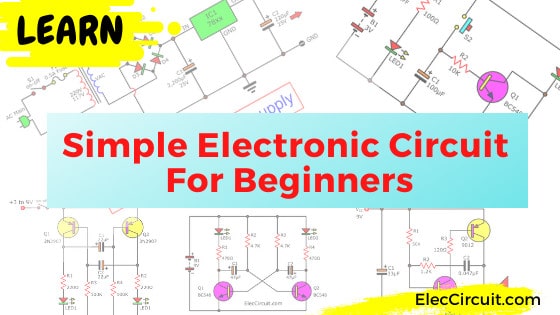
What is a simple electronic circuit?
My daughter has asked me: “What is an electronic circuit?” It is a combination of electronic components in a specific way. Whereby we connect it with the conductor wires for the electrical current to flow through.
What is a SIMPLE electronic circuit? It is a small circuit, uses a few components, and the working process is easy to understand. In my opinion, to keep it simple, it is the circuit that combines components under 25 pcs.
Why do we learn about the simple electronic circuit?
- Sometimes our work is required small circuits, so there is no point in using a larger circuit. Also, the smaller the cheaper. Comparable to “Do not use a sledgehammer to crack a nut”.
- The understanding of a Simple electronic circuit will help us learn about larger projects better. Because a large project is a lot of small electronic circuits together.
If you want to learn more about electronic circuits in depth or technically. I recommend reading more on Wikipedia.
However, you are only an electronic hobbyist like me. Let’s see the circuit for beginners below.
Recommended Simple Circuits
Below are the electronic circuits we have picked for you.
Two LED flasher circuits
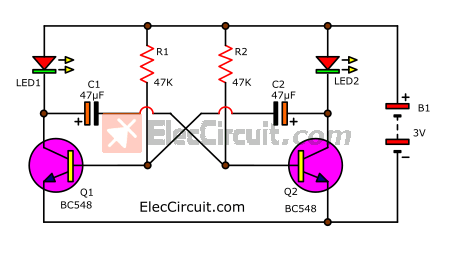
It is the simplest LED blinking circuit using transistor.
LM386 Audio Amplifier Circuit
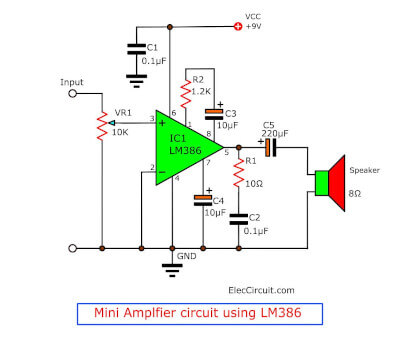
This was my first ever amplifier circuit. Which can be powered with a 9V or 3.7V Li-ion battery with as little current. With an amplification gain of up to 0.5W.
Simple Condenser Mic Preamplifier Circuit
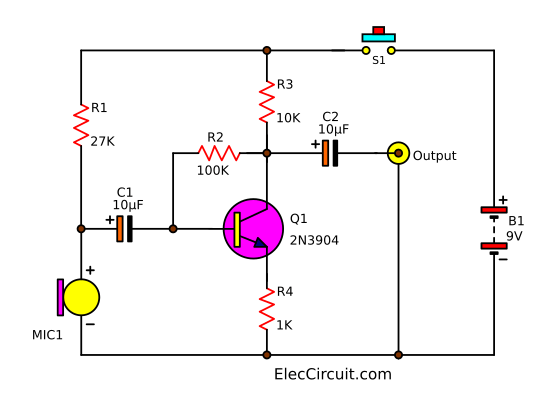
This small circuit can change sounds into audio signals using a 9V battery.
LED Chaser circuits using 4017 + 555
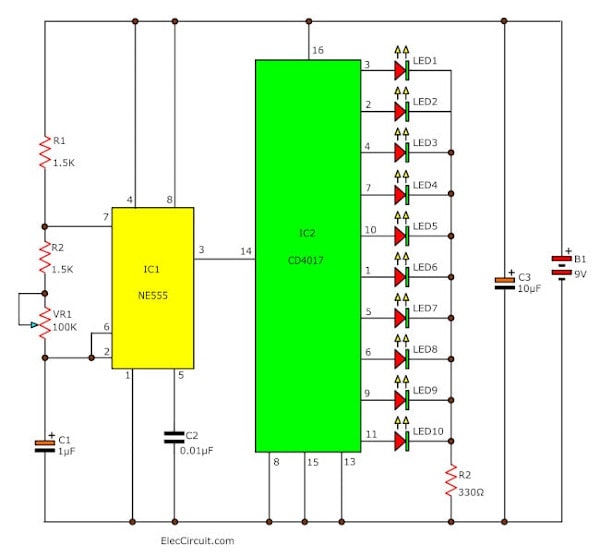
They use CD4017 to drive LEDs and IC-555 as an oscillator. It is for a beginner to learn a digital.
5-20 Minutes Timer using 555 timer
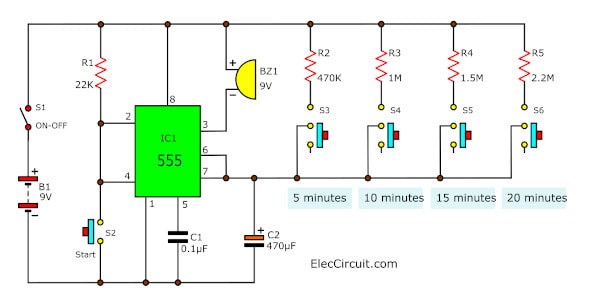
This small and portable timer circuit uses a 555 timer with a buzzer alarm sound. It has 5, 10, 15, and 20-minute presets chosen by switches.
Simple AC inverter circuit
This simple inverter circuit converts 12VDC to 220VAC using only 2 transistors, 2 resistors, and a transformer.
LM317 Power supply
Sometimes you might want a 1.5V power source that is not a battery, or maybe 13V, 4.5V, 7.5V, etc; build this variable-regulated regulator.
9V Regulator circuit using 7809
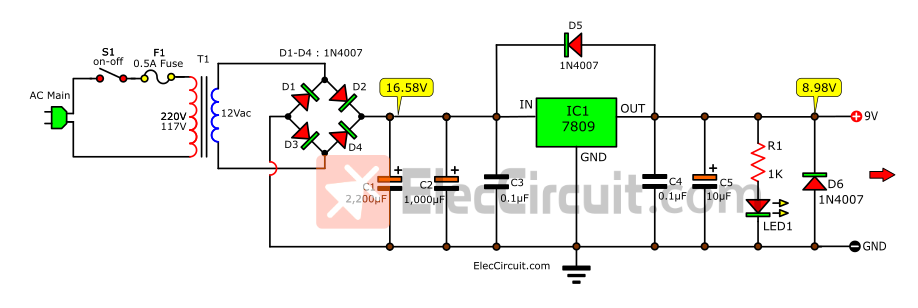
Let’s create this circuit to replace a 9V battery. It can deliver 10 times more current than the battery and save time and money to replace it.
12V Power Supply
It can supply all circuits that require a 12V DC source under 2A, or more with minor modifications. Read how to do: 12V Power Supply Circuit
6V, 12V, 24V Lead Acid Battery Charger
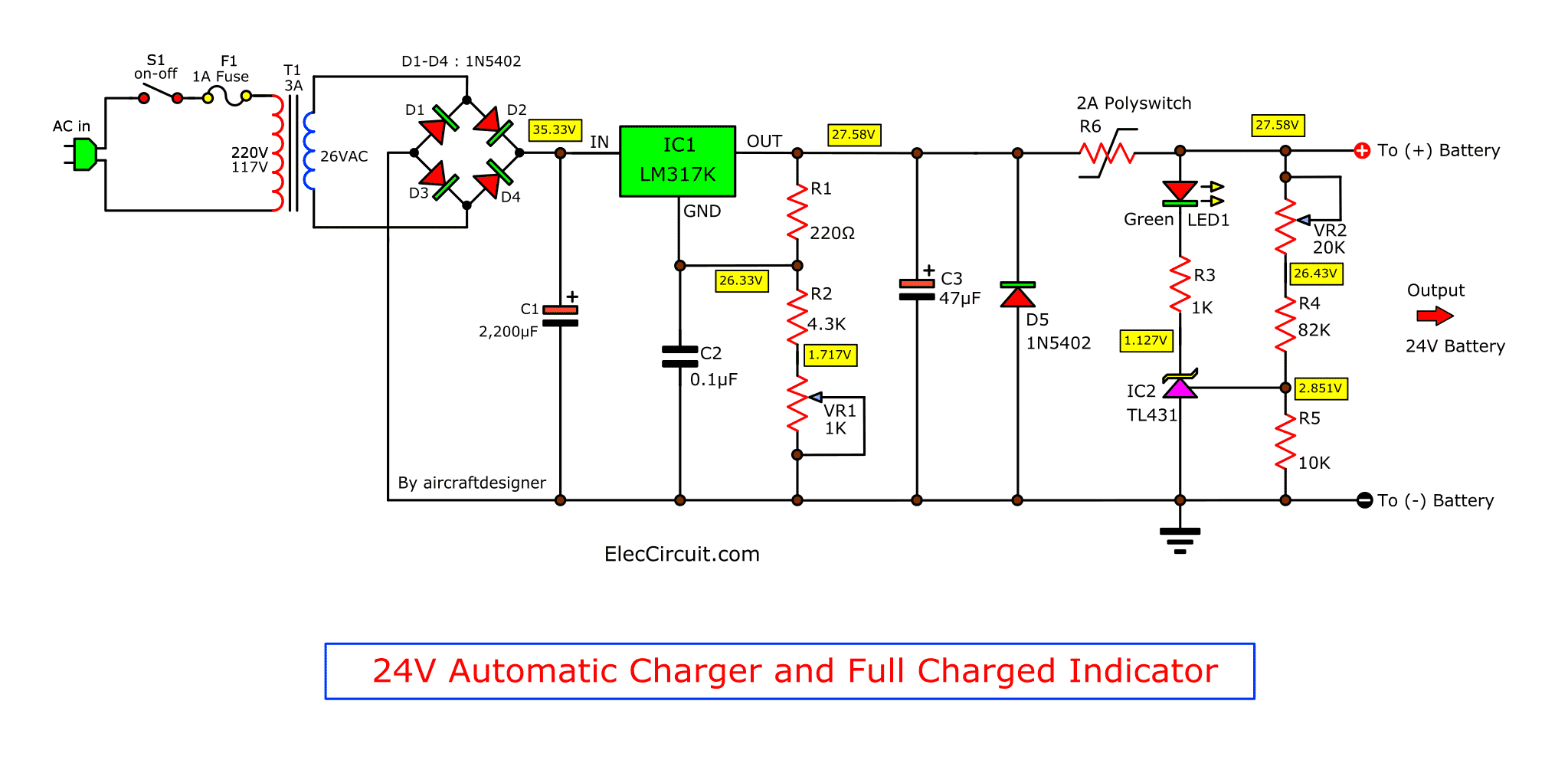
This shows many different lead-acid battery chargers for 6V, 12V, and 24V batteries using LM317 as the main component.
Other Simple Electronic Circuits For Beginners
Here is a list of basic electronic circuits, which you can look at below.
Sound Generator and Oscillator Circuits
Toy Organ circuit using transistors
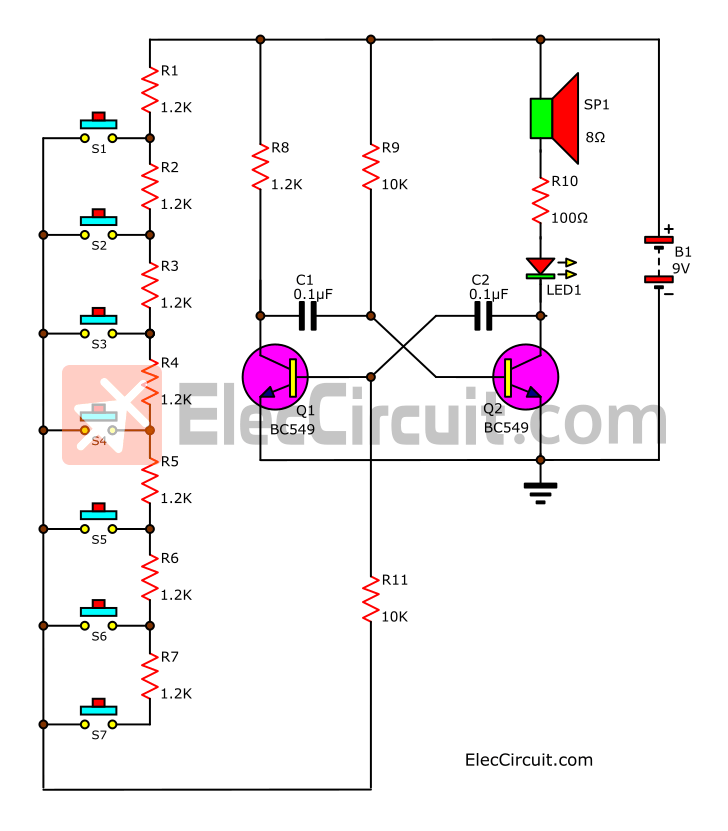
Let’s play with a simple toy organ circuit. A daughter of mine is interested in piano. But at the moment we are not ready to study it. Believe it or not, we can create a simple piano circuit by ourselves.
Making Simple Buzzer circuit
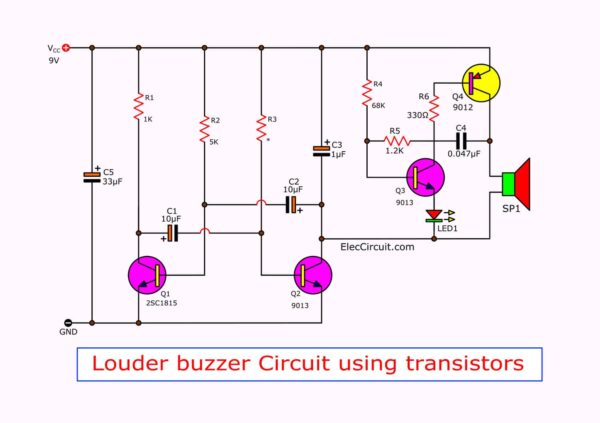
Let’s make the electronic buzzer circuit in simple ways. But useful and well worth it and the price is lower than 1$. By using just a 9-volt battery only.
Police siren circuits
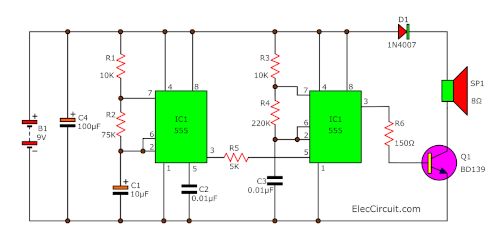
It is easy to do that. They have 3 circuit ideas for you.
Simple Bird Sound Generator Circuit
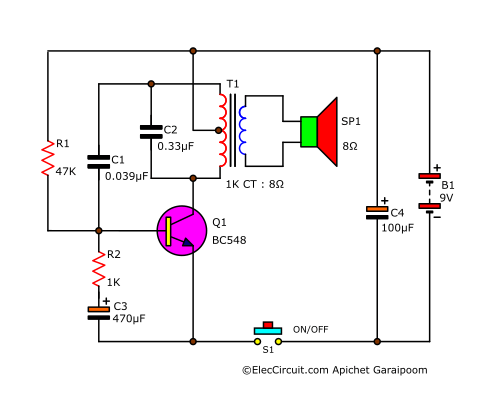
This Simple Bird Sound Generator Circuit was one of the first circuits I built as a child. It’s made up of only a transistor and a few others.
Simple Motion Sensor Alarm
If you have your own private space and do not want someone to intrude, this motion detector alarm circuit will definitely reduce your worries.
Signal injector circuits
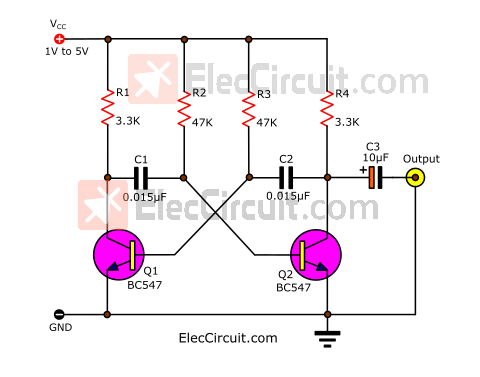
This simple circuit can be used to repair televisions, radio receivers, amplifiers, etc. It produces a small frequency signal using a 1.5V battery as a power supply.
Triangle wave generator circuit using Schmitt-Trigger
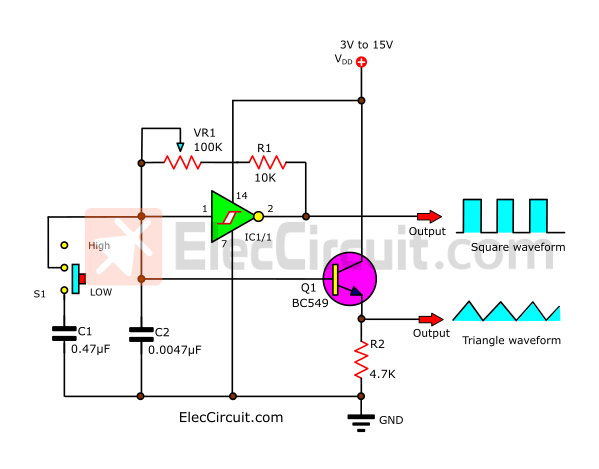
It can create a Square or Triangle wave at the output with just a small number of electronic components. I made this a while back to learn about CMOS Gates and an Astable Multivibrator.
60 Hz Clock Generator Circuit using MM5369
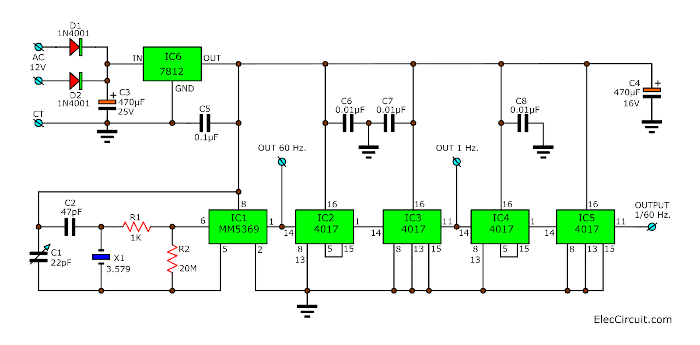
It uses MM5369 and crystal as the main components. So, they can be used as a calibrator for standard frequency. They also give 1HZ, 1/60Hz, and 3.579MHz at TP.
ICL8038 Function Generator Circuits
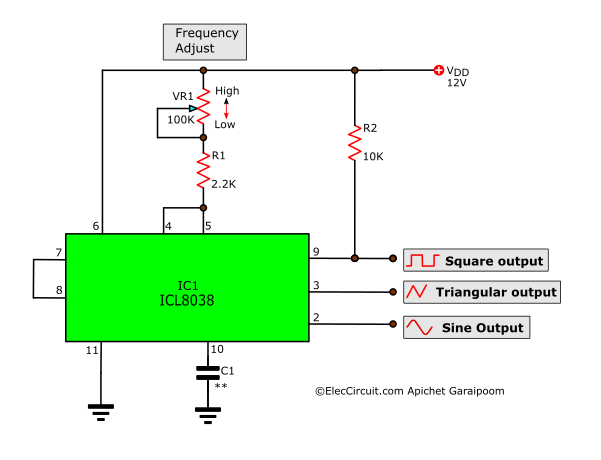
If we need a function generator circuit. We have many ways to do it. Using the ICL8038 waveform generator is a great option. It is easy to use and inexpensive.
FM wireless microphone circuit diagram
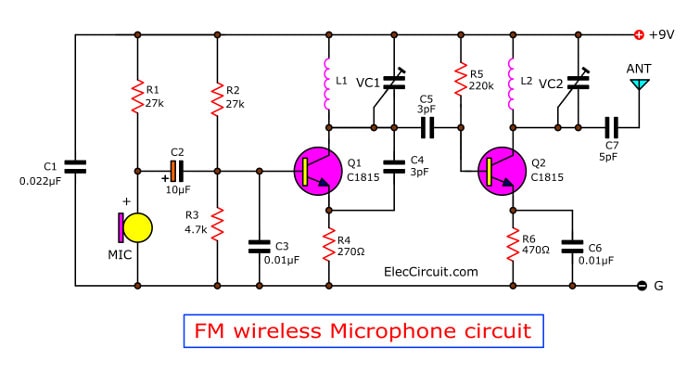
AM radio receiver circuit diagram
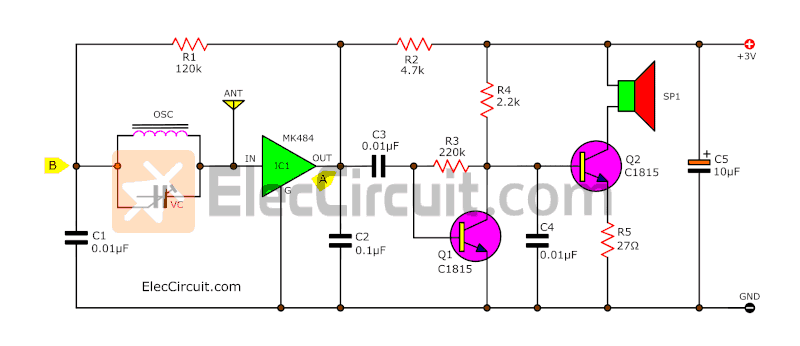
Audio Amplifiers
TDA2822 stereo amplifier circuit
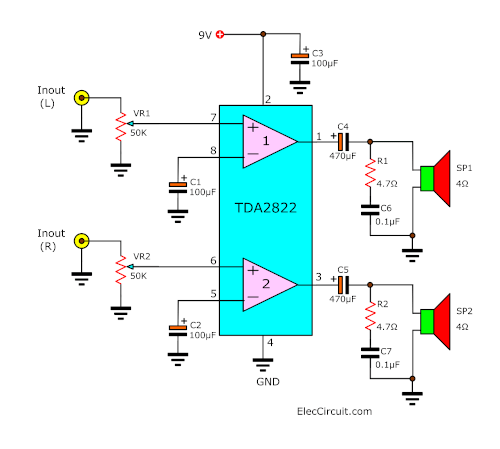
This is a small stereo power amplifier. People like it, me too. Why? Read more: TDA2822 amplifier circuit
- 4 transistor audio amplifier
- 3 transistors Audio Amplifier
- Simple transistor intercom
- Simple speaker delay
Simple Lighting and LED Circuits
1.5V LED flasher circuits
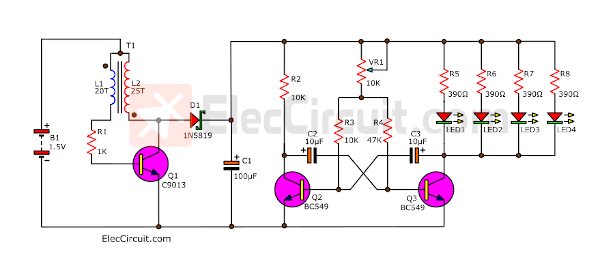
It’s efficient enough to last for 1 year. These circuits only use a few components consisting of two to three transistors, four resistors, and three capacitors.
Flashing Bicycle LED Taillight Circuit
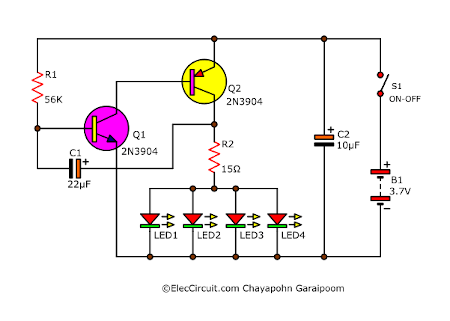
Using transistors instead of ICs because they are simple and economical. It is quite simple because there are few components. But learning its working principles is very interesting.
Read more: DIY bike light
Simple Automatic Motion Sensor Light Circuit
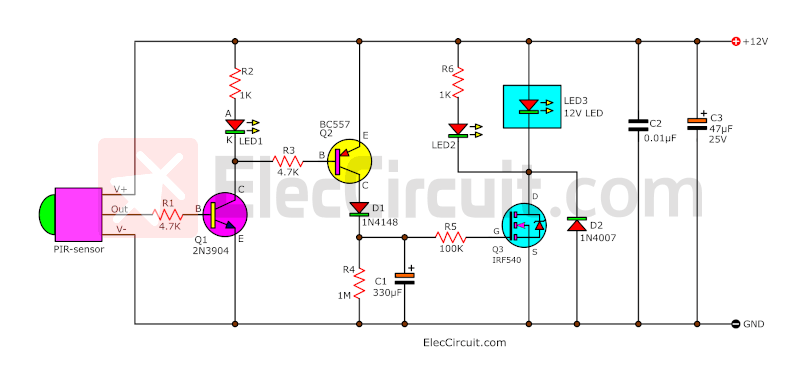
Is there a way we could save as much electricity as possible?
LED chaser circuit using transistors
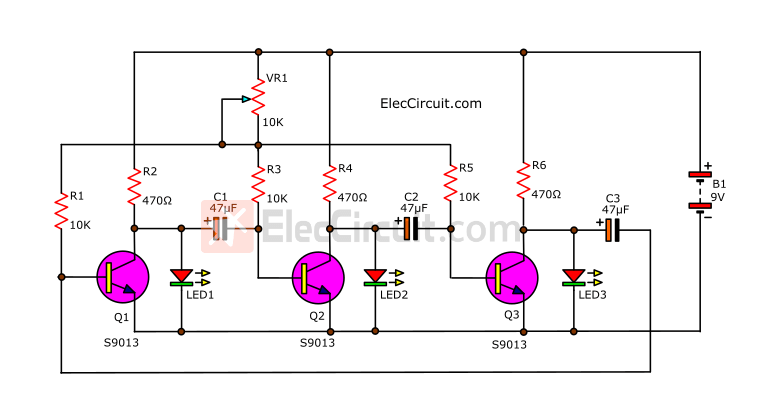
Since my daughter has tried making the LED chaser using ICs (CD4017 and NE555), it has worked well. But recently, she has been learning how to use transistors.
Simple Coin Toss Game circuits diagram
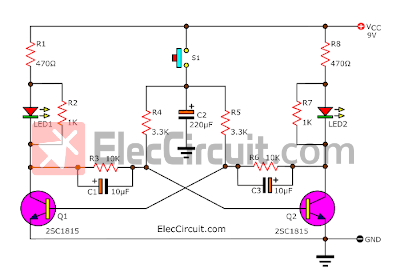
It is a type of simple electronic game that simulates a real coin toss with LEDs. You could build it in your free time to play and enjoy with others.
Solar Cell
Automatic Solar Light circuit
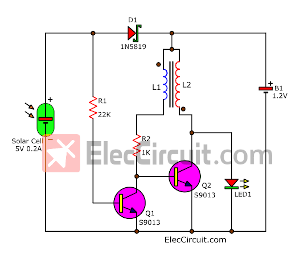
Let’s create a simple automatic solar light circuit or a Solar Night Light Circuit. My kids made it for daily use and to learn electronic circuits. They worked well, so we are happy.
Solar-powered Plant watering alarm circuit
It will sound an alarm whenever the soil is dry. So, we can water the plant to prevent it from dying. The solar cell works like a 6V DC power supply to save us money by not requiring batteries. It can be built easily with a few parts (without IC).
3 Automatic 12V Solar Light Circuits
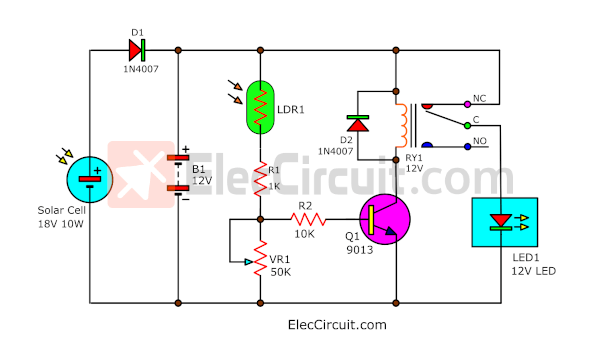
If we need lighting around our home at night. But those areas are without an AC line because it is hard to do the wiring there. And we also want to save on electricity costs.
Agricultural Circuit
Automatic Plant Watering with a Solar Cell
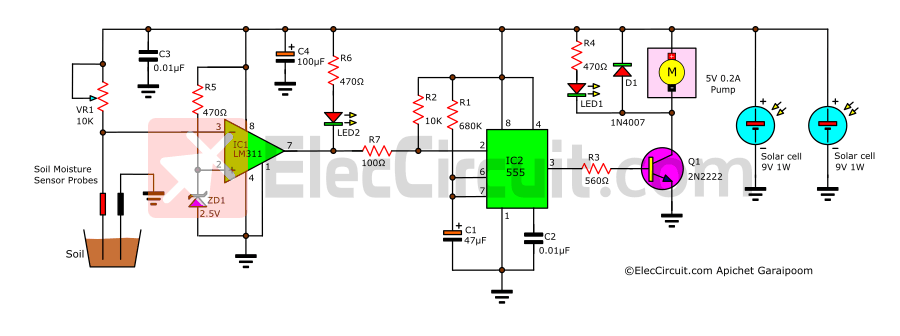
Using a solar cell, a DC pump, a 555 timer, and an LM311 comparator. It worked well and was also very efficient, requiring only power from the solar cell rather than a battery.
Motor Controller and Timer Circuits
OFF Delay timer circuit
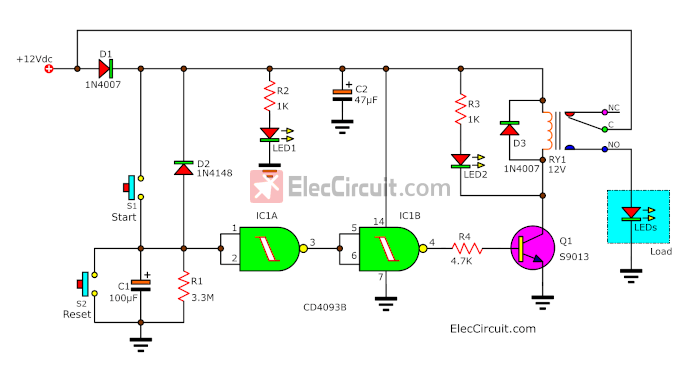
The easiest way is to turn on the light only when needed and turn it off when not. But in practice, we often forget to turn off the lights even when they are not needed.
30 min Transistor Timer Circuit
We can use this simple electronic circuit. To learn the basic timer circuit. The working of the circuit is based on learning the charge and discharge of the capacitor. And we can apply it to turn on-off electrical appliances. In the application, just put a relay instead of an LED.
Simple Speaker Turn-on Delay Circuit
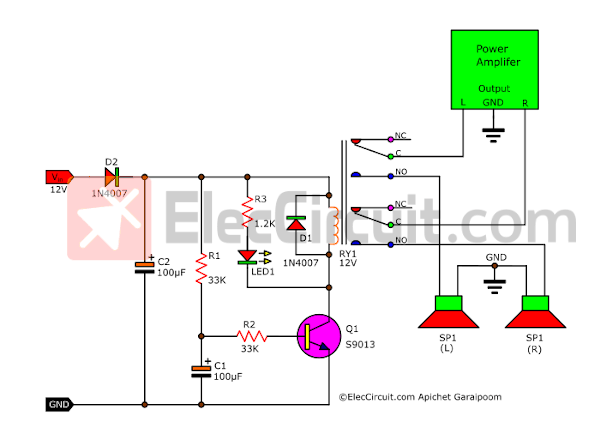
Every time you turn the OCL power amplifier on, within the first 3 S, you hear a loud “tlub” sound. It is annoying. Also, caused by a voltage spike that can damage the speaker. But this circuit can help
Automatic LED Night Light circuits
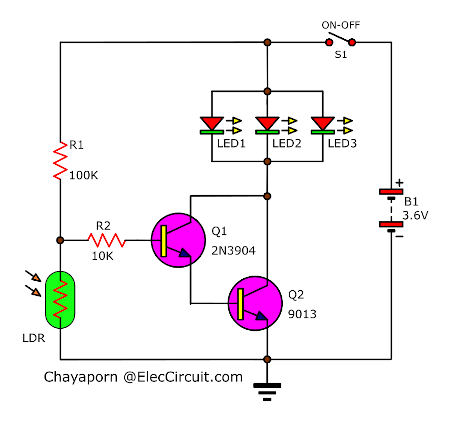
Try making a simple automatic LED flashlight circuit with only 5 basic components. And, we would have learned about the transistor, LDR, LED, and more that work together as a voltage divider.
10 Key Code Lock Switch Circuit
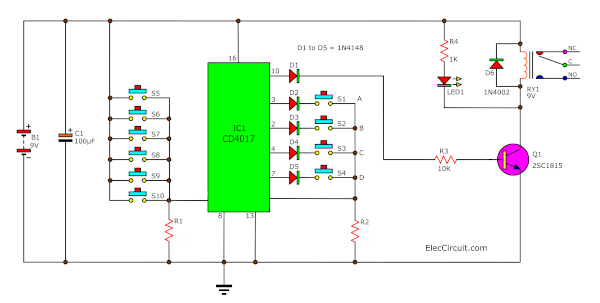
We do not need to carry a load key and do not worry about your keys being lost. We just must remember to commit to code only.
Digital Electronics Projects using Flip Flops
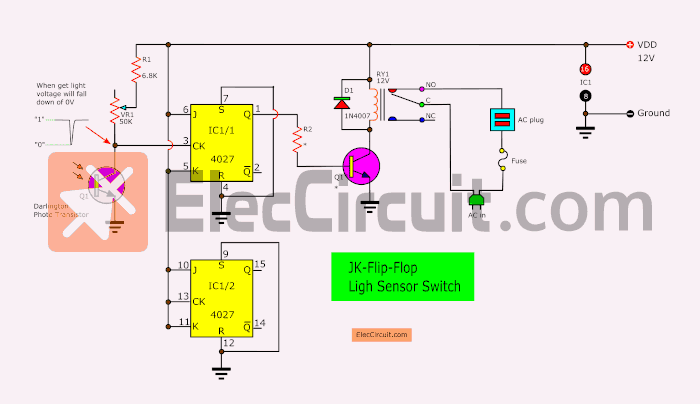
I am going to show you these Flip-Flop Switch Circuits. Imagine you can use your life is better with your own electronic project.
Meter, Tester, Detector
Battery Voltage Monitor circuit
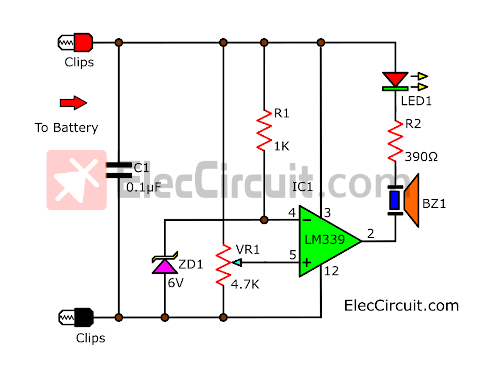
When the voltage level is lower below 12.4V. To extend the lifespan of the battery, we should always bring it to be fully charged. The circuit will alert us.
Non-Contact Voltage Tester circuit
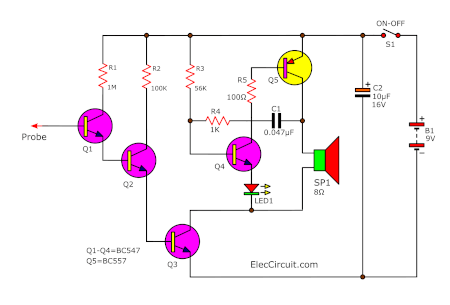
Do you want a tool to check the AC main without touching it? This simple electronic circuit can do it and uses transistors without IC. Read more: Non-Contact AC Voltage Detector Circuit
Simple Water Level Alarm Circuit using a Transistor
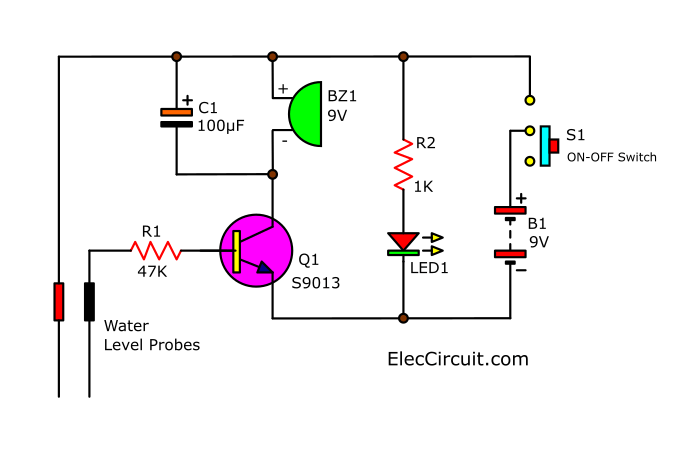
It worked by sounding an alarm when the water level rose to the set level. So we can close the water valve in time and prevent an overflow with only basic electronic components.
Battery Voltage Monitor circuits

When the voltage level is lower below 12.4V. To extend the lifespan of the battery, we should always bring it to be fully charged. The circuit will alert us.
Continuity Tester Circuit with Buzzer and LED
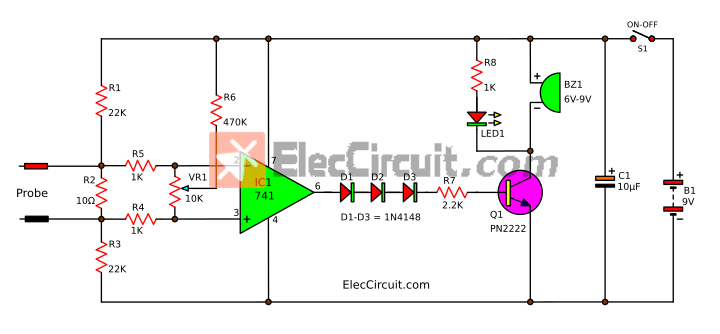
This is a continuity tester circuit with a buzzer and LED. Also, I like this circuit. Because unnecessary to take my eyes off the tested circuit. We will hear the buzzer and see the LED glow.
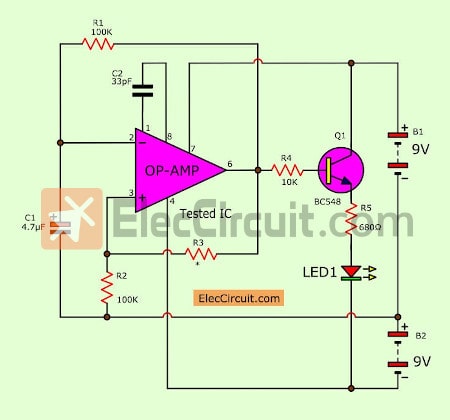
You can use them to fast-check the many op-amps IC good with blinking LED circuits. It has a few parts so cheap and easy to build.
Battery Charger Circuits, Linear Power Supplies
7805 Constant Current Battery Charger circuit
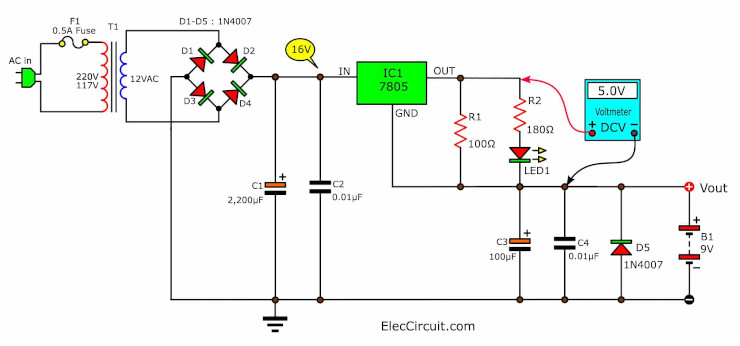
7805 has many helpful. One thing is we can use them as constant current regulation. It is so easy and more convenient than using transistor circuits.
3.7V Li-ion Battery Charger Circuit
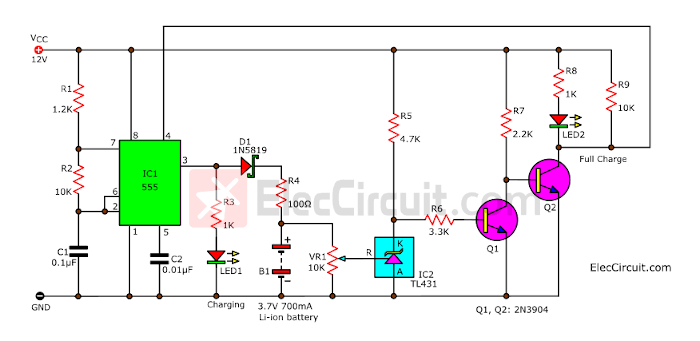
We made the circuit with commonly used components such as the NE555 timer and TL431 shunt regulator. It uses the principle of charging the battery with a low-current pulse signal. Making it a safe and impressionable performance charger.

Here is a constant current and voltage AA Ni-MH battery charger circuit.
Simple 1.2V AA Ni-MH Battery Solar Charger circuits
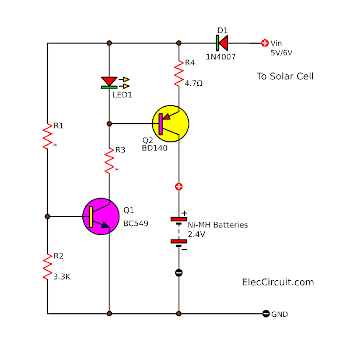
Create it with common parts for charging 1.2V AA, So easy and cheaper.
Constant current circuit using transistors
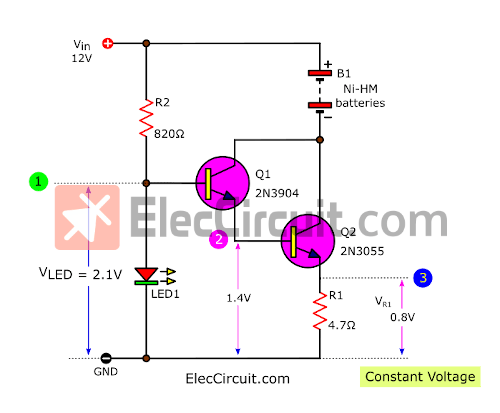
Learning experiments with a simple constant current circuits using transistors, and a few plain parts, was so helpful, especially the Ni-HM battery charger.
Gel cell battery charger circuit
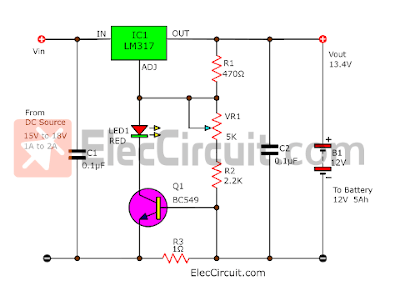
It can charge any size of the Gel cell battery and extend the life of the Gel Cell battery. While the circuit is running, the LED indicates charging
DC Converter and Switching Mode Regulator Circuits
5V Low Dropout Regulator Circuit using transistor
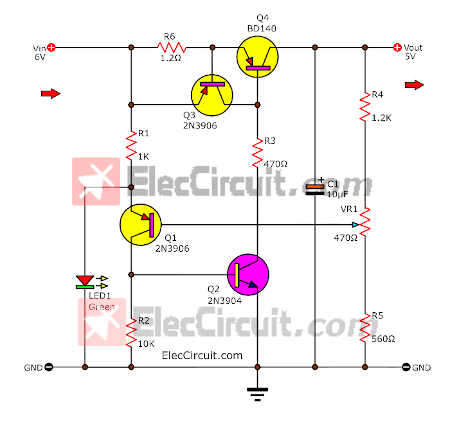
The 6V input voltage can make the output regulator 5V 0.5A. So, the voltage across it is 1V only.
Read more: 5V transistor Low Dropout Regulator Circuit
3.7V to 5V Boost DC converter
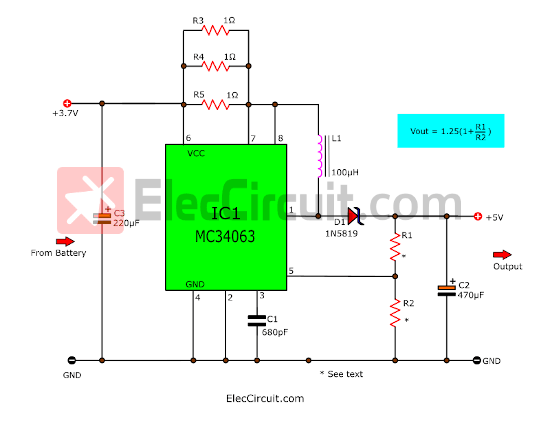
Here is a 3.7V to 5V boost converter or step-up switching circuit using MC34063 and a few parts,1N5819,100uH. For 200mA-300mA of load current.
USB 5V to 12V DC-DC Step-Up Converter circuit
This circuit will increase the voltage from 5V to 12V load without IC. It is good to learn a switching mode regulated power supply in low power output.
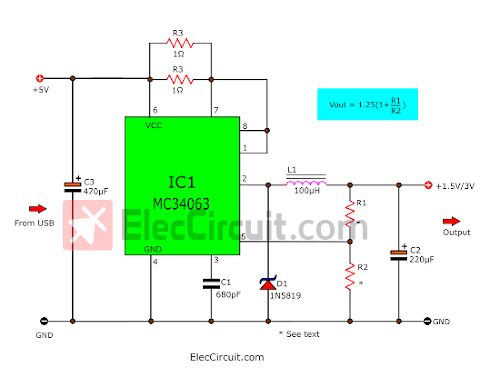
1.5V or 3V Step-up Switching regulator circuit
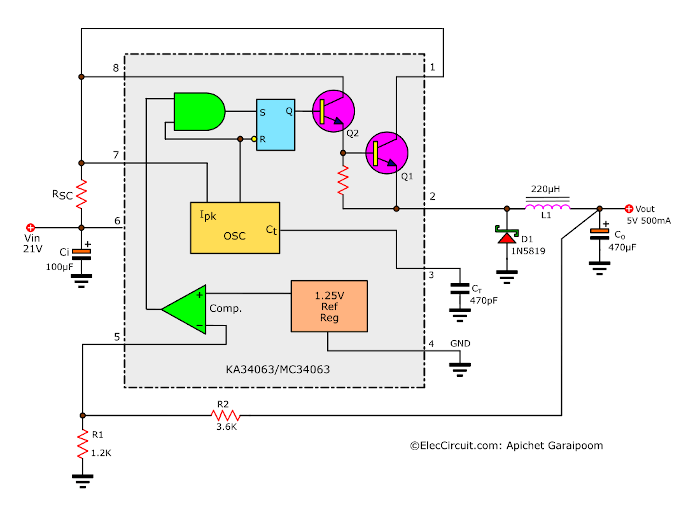
5V 0.5A Simple Switching Regulator circuit
- 1.5V or 3V Step-up Switching regulator circuit
- 5V 2A Buck converter circuit using KA34063
- USB 5V to 1.5V/ 3V Step Down Converter
- 1.5V to 5V boost converter circuit
Conclusion
You will see that these circuits are simple, or in some cases, basic circuits, which can help solve our problems. We hope you get the most out of it and are able to improve it over time.
GET UPDATE VIA EMAIL
I always try to make Electronics Learning Easy.
Related Posts

I love electronics. I have been learning about them through creating simple electronic circuits or small projects. And now I am also having my children do the same. Nevertheless, I hope you found the experiences we shared on this site useful and fulfilling.
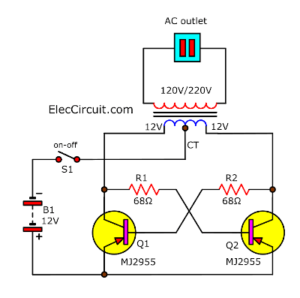
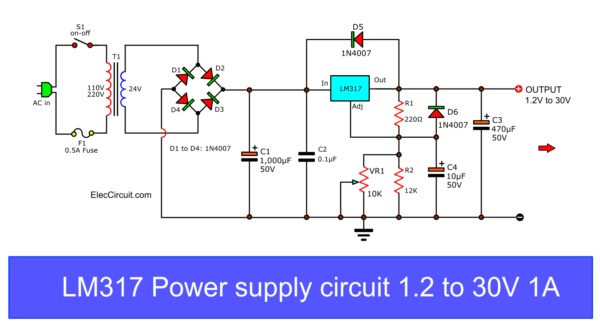
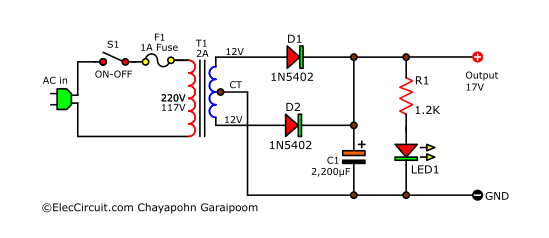
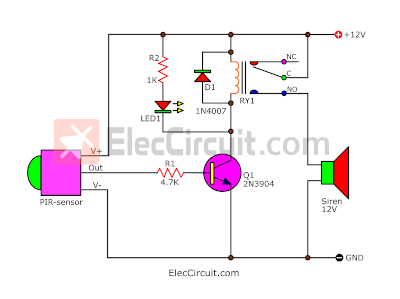
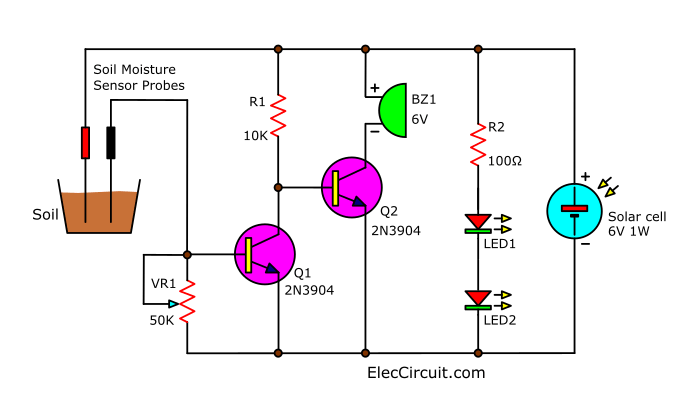
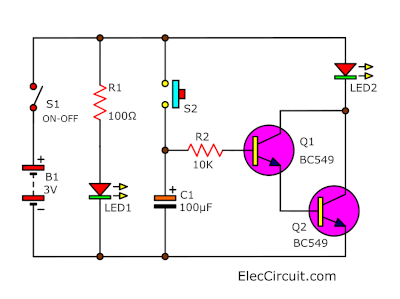

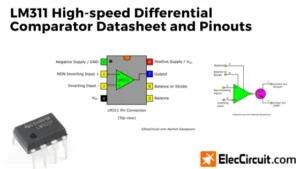


Hi
I don’t know much about electronic circuits and I would love to try, how can i tell the vaultage of the capacitors used?
If am to go buy the components from a radio shack?
Hi, Dee dave,
Thanks for your feedback.
Also, I do not know a lot of Electronics.
Every day, time is running so fast I need to take care of my children.
When I have free time I will learn electronics with make circuit and share it.
It is good ideas to learn capacitor. It is useful basic.
You should learn first, then you can know to buy. Because sometimes you can save with buy a few components for make a lot of projects. For example, You can use 1N4007 (1000V,1A) instead of many silicon diodes, 1N4001,1N4002 etc. They are the same prices. I hope you can understand my English is poor. Of course, I will try to improve it.
Can I get PCB for some of the project such as Video Amplifier,O-30 volt power supply
The simple projects of electronics students. we providing embedded system training in trichy for all steaming students.
Good site for coding. If I have free I will learn too.
can you design a circuit that can produce square wave ,saw tooth and sin wave and show me where the terminals of an oscilloscope and power supply are connect please
ecually i want a design of an oscilloscope
Hi Mziwenkosi,
Please see the function generator: https://www.eleccircuit.com/xr2206-function-generator/
Your idea is very interesting. If your project is successful. Do not forget to share with me, thank you.
How do I go about starting a design for an inverter that outputs 15kv ac?starting with the first segment of the design, what questions do I ask myself? How do I decide what values to give the components of each part of the design? Sort of a DC to DC to AC Coninvertor so to speak. Or am I just whishfull thinking? Either way how do I start giving values to the components to make a DC to DC Converter Work for a Set Voltage in mind, say 300kv? How do I set the first voltage divider and establish a working Vs?
Thank you,
Michael Cote’
Tl082 surround circuit
Hello Saravanan,
Do you want a surrounding circuit?
hello, sir nice and valuable information in your article. the diagram is very easy and easy to read and make.
sir, I want to know that in one of your diagrams like Learn 30 Minutes Transistor Timer you mention The Transistor value BC 549, I think this is an on/off switch transistor.
sir can use BC 547,548 for this circuit.
Hello raj,
Thanks for your feedback.
Yes, you can use BC547, BC548, and BC549 or BC550. They are small NPN transistors.
What kind of software do you use to generate those funky colorful schematics?
Hello Witek,
Thanks for your visit. I like your question.
Now I use the Inkscape software on Ubuntu OS.
Before, I used Illustrator on MAC and Corel draw on Windows OS.
Have a great day.
Thanks
I want to make 24V battery low voltage alarm circuit
Hello Ganesh Shinde,
Thanks for your visit to my site.
I am sorry. Now, I do not have a 24V battery low voltage alarm circuit.
But it is much interesting. I like this.
Unfortunately, I am busy. I would like to find/test this circuit for you.
I may use LM339 as the main. https://www.eleccircuit.com/lm339-quad-comparator-ic-datasheet/
But I will add a 12V regulated power supply for LM339. Because It should get 12V stable voltage.
Then, at the input, I will use the voltage divider circuit with 2 resistors and use a potentiometer to set sensitivity.
This is just an idea. But I cannot confirm it will work well.
Please think first to try it. Have fun.
thanks for this great work
Thanks for your feedback.
There are a few projects where you have added PCB artwork… would it be possible to get the PCB artwork in Gerber format, where we could get the board made by JLCPCB for only a couple of dollars
Nice explanation about the circuit with neat diagram.
Hello,
Thanks for your feedback. We will keep doing it. Thank you for your encouragement.
These are great circuits for the beginner. I assign some of the circuits to my class to work on in lab. They give them good breadboard practice as well as drawing the circuits to make their own PCB from my cnc circuit board router. Thanks for making this page..
Hello vic james,
I am glad that my website is useful to your students. I will continue improving my content by adding circuit assemblies on a breadboard, a perforated board with a soldering iron, or even on a fabricated PCB. In the future, if I have enough funding, I would also like to have a CNC machine to speed up PCB prototyping.
If you have any feedback or recommendations, please do let us know.